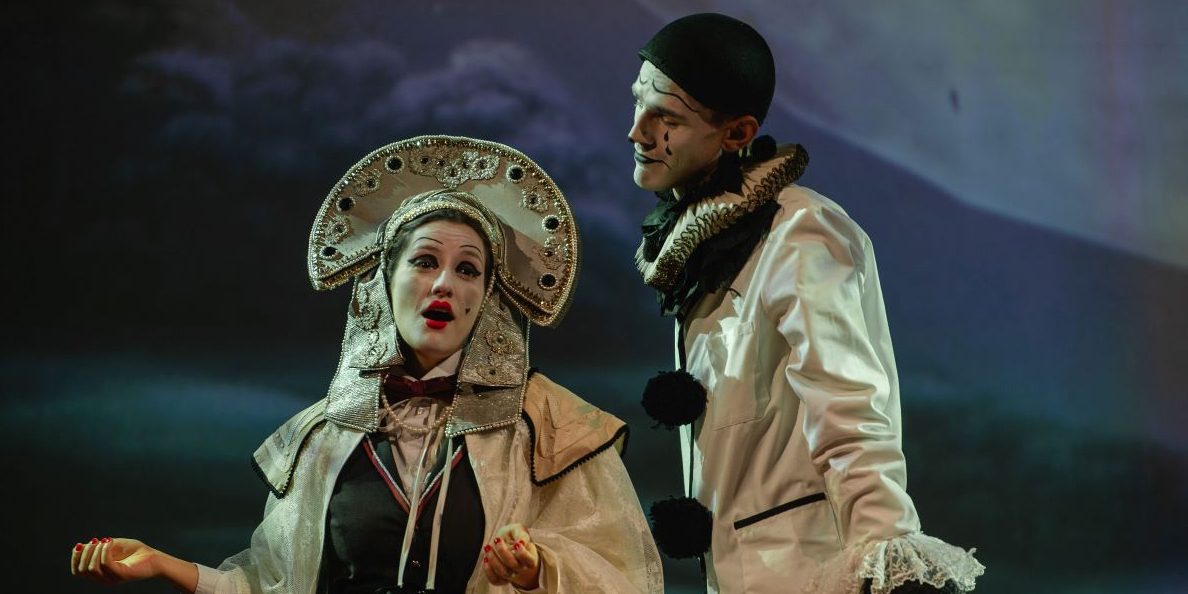The Guildhall School has in recent years revived many one-act operas – a strategy that ensures as many roles as possible for the students and introduces the audience to several neglected items from the repertory. However, three operas together could generate a merely random set of hors d’oeuvres, and so on this occasion a lot of thought has gone into devising a single unified set and scenario – a 1920s picture house through which all the cast pass as performers, backstage staff and audience. It is a neat manoeuvre engineered with elegant excellence through the set of Simon Corder and the costumes of Laura Jane Stanfield, with many neat connections carried over from one opera to the next by director Rodula Gaitanou. It scatters the fairy dust of the world of ‘Cinema Paradiso’ over three contrasting works some of which might otherwise seem a little slight.
First up is Massenet’s ‘Portrait de Manon’, the 1894 sequel to his more famous original, and borrowing some of its most notable themes. In this work Des Grieux reminisces over lost love and is ultimately persuaded to bless rather than frustrate the love affair of his protégé. Here the production values help lift the piece by setting it in the projection room of the cinema, thus justifying a real silent film based on ‘Manon’, and projection of images of the lost heroine. Michael Lafferty-Smith is excellent in the main role, finding a precise intensity and pathos in the finely wrought vocal lines; and the young lovers, junior employees at the cinema, likewise project their characters plausibly and act with conviction.
For the second offering the set is reshaped so that we get a stage within the stage for Ethel Smyth’s ‘Fête Galante’. This is another well-made piece, with fewer memorable melodies but characteristically individual and quirky orchestration. In essence this is a variation on familiar tropes from the tradition of ‘commedia dell’arte’, with the roles of Harlequin, Pierrot and Columbine to the fore. It is a complicated tale of jealousy, mistaken identities and disappointed love where a brilliant vocal style is needed together with moments of stylised grief (here the excellent Jonathan Eyers as Pierrot). The cast carry this all off with panache and the score is well pointed by conductor Dominic Wheeler in the pit who coordinates all the various elements of chorus, soloists and orchestra very effectively. Though it is primarily a late Romantic sound-world, the pin-sharp delivery is worthy of Stravinsky’s take on Neo-Classicism.
The best piece and performance is saved until last. We know Nino Rota primarily as a film composer, but he also wrote ten operas and on the strength of ‘I Due Timidi/The two Timid Ones’ we should certainly know more about them. This opera was written for radio in 1950 in a lush idiom indebted to Puccini, though with jazz and Italian folk elements too. Bittersweet comedy is the tone here as two timid lovers try but fail to get together, deterred by a chapter of accidents and their own inhibitions. Here the direction is at its sharpest assisted by the excellently succinct musical characterisation of all the characters, even the minor ones. There is a lot of adroit stage business enacted with gusto by the students and a good time is clearly had by all on stage and in the audience.
The main protagonists are repackaged here as box office staff, so the set is again reconfigured, this time as front of house with two box offices facing one another, symbolizing their separation. Mark Bautista and Lorna Maclean are fully in command of the rich vocal paragraphs, and they are ably assisted by Alexandra Achillea Pouta as the owner of the cinema, and Jack Dolan as a conniving doctor. There is also some lovely lyrical singing from Joe Chalmers as the narrator/doorman. Just as with Puccini’s ‘Gianni Schicchi’, whose sound world it resembles, this piece requires hugely skilful ensemble work to work well, and it is a tribute to everyone involved that it is so fleet of foot and varied in mood from slapstick comedy through to romantic disillusionment.
It should be noted that this review is based on the final performance, and therefore comments on the second cast.

